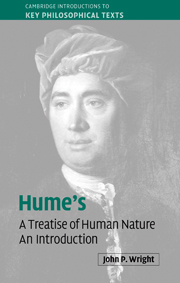Book contents
- Frontmatter
- Contents
- Preface
- Acknowledgments
- List of abbreviations
- 1 The author and the book
- 2 First principles
- 3 Causation
- 4 Skepticism
- 5 Determinism
- 6 Passions, sympathy, and other minds
- 7 Motivation: reason and calm passions
- 8 Moral sense, reason, and moral skepticism
- 9 The foundations of morals
- Bibliography and further reading
- Index
3 - Causation
Published online by Cambridge University Press: 05 June 2012
- Frontmatter
- Contents
- Preface
- Acknowledgments
- List of abbreviations
- 1 The author and the book
- 2 First principles
- 3 Causation
- 4 Skepticism
- 5 Determinism
- 6 Passions, sympathy, and other minds
- 7 Motivation: reason and calm passions
- 8 Moral sense, reason, and moral skepticism
- 9 The foundations of morals
- Bibliography and further reading
- Index
Summary
In this Chapter, I consider what is undoubtedly the most original and influential part of the Treatise, namely Part 3 of Book 1, where Hume presents his theory of causation. It is easy to lose sight of his central discovery concerning causation as we go through the details of his theory. While Hume scholars disagree on some of these details, there is general agreement that this central discovery was epistemological and that it had profound results in our intellectual history. Hume expresses his central epistemological claim toward the end of Part 3 when he writes that
there are no objects which, by the mere survey, without consulting experience, we can determine to be the causes of any other; and no objects which we can certainly determine in the same manner not to be the causes. Any thing may produce any thing. Creation, annihilation, motion, reason, volition; all these may arise from one another, or from any other object we can imagine … The constant conjunction of objects determines their causation …
(T1.3.15.1: 173; the first italics are mine)Before Hume, major thinkers held that we have some knowledge independently of experience as to what kinds of things can and can't produce other kinds of things. Even Newton and Locke held that it is impossible for the order we discover in the universe to arise from anything but a thinking intelligent being.
- Type
- Chapter
- Information
- Hume's 'A Treatise of Human Nature'An Introduction, pp. 79 - 128Publisher: Cambridge University PressPrint publication year: 2009

